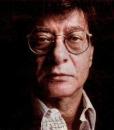Mahmoud Darwich

Mahmoud Darwich was among the most celebrated Arab poets of his generation. Born on March 13, 1941 in Al-Barwa, Galilee, he was only seven years old when the Israeli-Palestinian war broke out. Forced into exile after the destruction of his hometown, his family took refuge in Lebanon, before clandestinely moving back to the newly created Israeli state. After graduating high school, Darwich moved to Haifa. At 19, he published his first book of poetry, Wingless Birds. At 20, he was clandestinely involved with the Judeo-Arab Communist Party and became an assistant-editor for Al-Fajr, a literary periodical opposing the Israeli government. His second volume, Leaves of Olives, was a runaway success in the Arab world, and unwittingly turned Darwich into an icon of Palestinian resistance againt Israel.
Darwich was arrested and jailed on multiple occasions between 1961 and 1967.The poetry he wrote then expressed his dreams of nationhood, revolt, and identity. He was placed under house arrest in 1970, but managed to escape and left Israel to study in the USSR, where he read political economy at the University of Moscow for one year. He then moved to Cairo in 1971, then to Beirut two years later to work as editor-in-chief at the Palestinian Research Center of the Palestinian Liberation Organization (PLO). In that capacity, he wrote several speeches for Yasser Arafat.
The Israeli invasion of Lebanon in the summer of 1982 forced Darwich to flee Beirut to move to Tunis. In 1987, he became a member of the Executive Committee of the PLO, which he quit in 1993 over disagreement with the PLO leadership over the Oslo Accords, which he did not think would bring lasting peace to the region. Two years later, Mahmoud Darwich traveled to Gaza, and soon after permanently moved to Ramallah, in the West Bank, where he was the editor of Al-Karmel. As a member of the PLO, Darwich was banned from reentering Israel, but an exception was made in 1995 when the Israeli government let him return to attend the funeral of his colleague, Emile Habibi.
In his many years of exile, Darwich never ceased to advocate on behalf of the Palestinian cause. His writings from abroad were widely celebrated in Palestine. Among the most famous, Identity, Rita,or Yearn for my Mother’s Bread, have become generational anthems in the Arab world.
Mahmoud Darwich died on August 9, 2008, in Houston, Untied States, following open heart surgery, aged 67. Following his death, three days of national mourning were observed in Palestine. By the time of his death, Darwich had published over thirty books, translated in over fourty languages. A world-renowned poet speaking on behalf of oppressed Palestinians, Darwich had been the laureate of numerous prizes, including the 2004 Prince Claus Prize.
Darwich was a pacifist poet and remained steadfast in his commitment to the freedom of his people, but always refused to be reduced to the role of a mere spokesman for the Palestinian cause. He wanted to be seen not as an activist, but as a poet; not as a victim forced into exile, but as a man of no borders, devoted to the cause of liberty and justice.
This is why his poetry still resonates so strongly today.
The suffering of his people, however, was for him a deep wound. “One can only live with the injury of a disappeared homeland,” he once said to Le Monde, if a balanced coexistence is established between the “two realities” of the Israeli Jewish and the
Palestinian Arab, “none of which can eliminate the other.” Throughout his life, Darwich advocated for the establishment of an independent Palestinian state, without challenging Israel’s right to exist. He was, in this sense, the embodiment of values of brotherhood, equity, and peaceful coexistence between Israeli and Palestinians.
(by Margaux MIGNARD)
